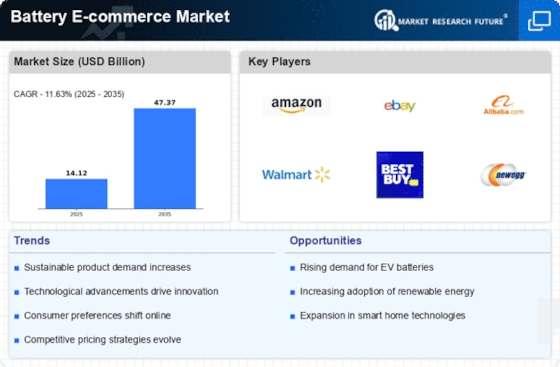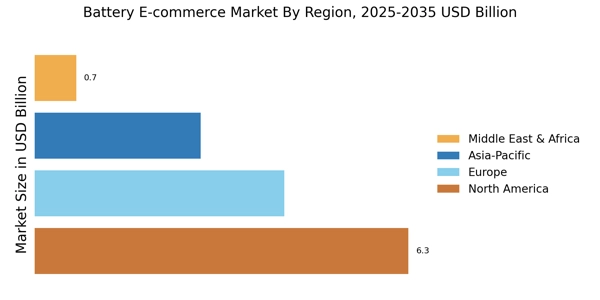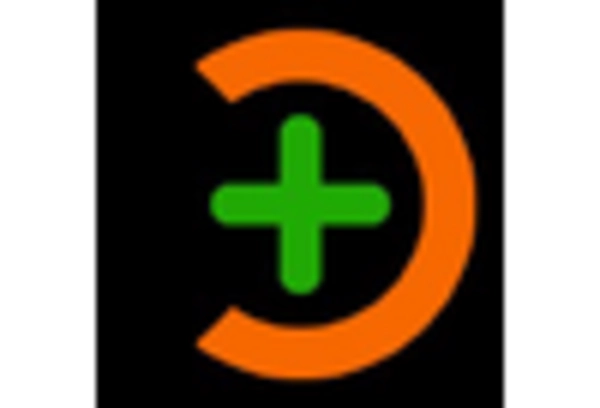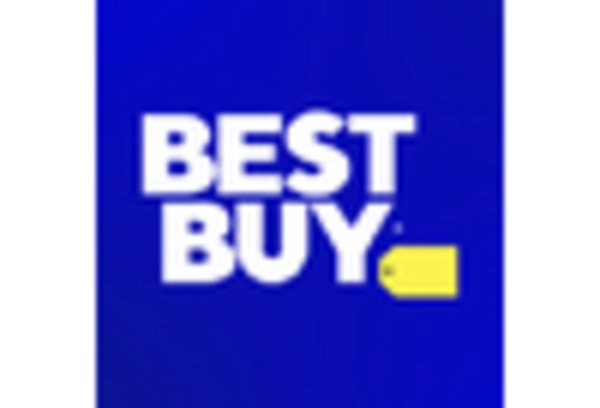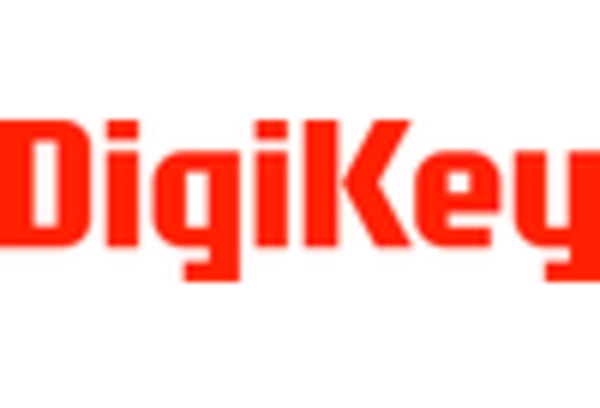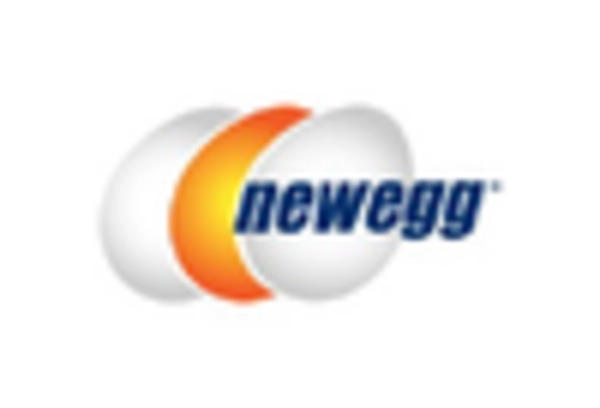Growth of Electric Vehicles
The transition towards electric vehicles (EVs) represents a pivotal driver for the Battery E-commerce Market. As governments and consumers increasingly prioritize sustainability, the demand for EV batteries is expected to escalate. In 2025, the EV market is anticipated to grow at a compound annual growth rate of around 15%, significantly impacting battery sales. E-commerce platforms are likely to play a crucial role in this transformation by providing easy access to high-capacity batteries tailored for electric vehicles. The Battery E-commerce Market must focus on partnerships with manufacturers to ensure a steady supply of advanced battery technologies, such as solid-state batteries, which promise enhanced performance and safety. Additionally, the growing infrastructure for EV charging stations may further stimulate battery sales, as consumers seek reliable and efficient energy solutions for their vehicles.
Advancements in Battery Technology
Technological innovations in battery design and manufacturing are reshaping the Battery E-commerce Market. Recent advancements, such as the development of fast-charging and longer-lasting batteries, are likely to attract consumers seeking enhanced performance. In 2025, the market for advanced battery technologies is expected to grow significantly, with projections indicating a potential increase of 12% in sales. E-commerce platforms must stay abreast of these developments to offer cutting-edge products that meet evolving consumer expectations. The Battery E-commerce Market should also focus on educating consumers about the benefits of new technologies, such as solid-state batteries, which promise improved safety and energy density. By leveraging these advancements, e-commerce businesses can position themselves as leaders in the battery market, catering to a tech-savvy audience eager for the latest innovations.
Rising Demand for Portable Electronics
The increasing prevalence of portable electronic devices, such as smartphones, tablets, and laptops, drives the Battery E-commerce Market. As consumers seek convenience and mobility, the demand for high-performance batteries has surged. In 2025, the portable electronics segment is projected to account for a substantial share of the battery market, with estimates suggesting a growth rate of approximately 8% annually. This trend compels e-commerce platforms to expand their battery offerings, catering to diverse consumer needs. The Battery E-commerce Market must adapt to this demand by ensuring a wide range of battery types, including lithium-ion and nickel-metal hydride, to meet the specifications of various devices. Furthermore, the rise of remote work and online learning has further fueled the need for reliable battery solutions, making it imperative for e-commerce businesses to enhance their inventory and distribution strategies.
Consumer Preference for Online Shopping
The shift in consumer behavior towards online shopping is a crucial driver for the Battery E-commerce Market. As more individuals opt for the convenience of purchasing products online, e-commerce platforms are experiencing a surge in battery sales. In 2025, it is estimated that online sales of batteries will account for over 30% of the total market share, reflecting a growing trend in consumer preferences. This shift compels businesses to enhance their online presence and optimize their supply chains to meet the increasing demand. The Battery E-commerce Market must also focus on providing detailed product information and customer reviews to facilitate informed purchasing decisions. Additionally, the integration of user-friendly interfaces and efficient delivery systems will likely enhance customer satisfaction, further driving the growth of battery sales through e-commerce channels.
Increased Focus on Renewable Energy Storage
The rising emphasis on renewable energy sources, such as solar and wind, is a significant driver for the Battery E-commerce Market. As more households and businesses invest in renewable energy systems, the need for efficient energy storage solutions becomes paramount. In 2025, the energy storage market is projected to expand at a rate of approximately 20%, indicating a robust demand for batteries capable of storing renewable energy. E-commerce platforms are likely to capitalize on this trend by offering a variety of battery options, including lithium-ion and lead-acid batteries, designed for energy storage applications. The Battery E-commerce Market must also consider the integration of smart technologies that enhance battery management systems, ensuring optimal performance and longevity. This focus on renewable energy storage not only supports sustainability goals but also presents lucrative opportunities for e-commerce businesses to diversify their product offerings.


